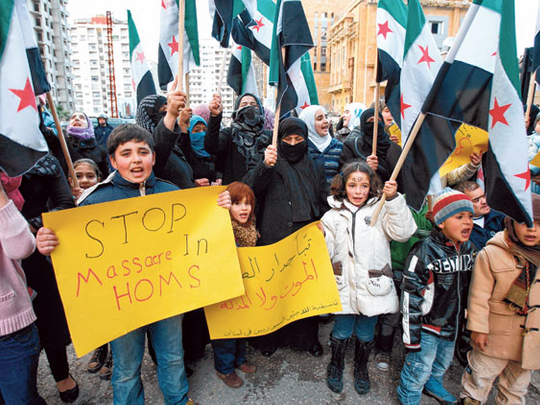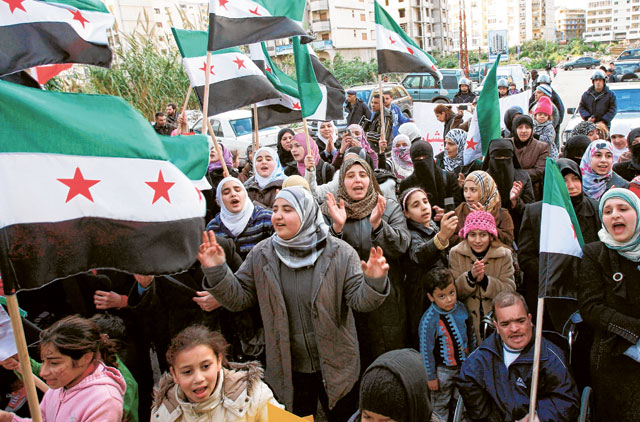
Beirut: Lebanon, the perpetual arena for various Arab countries to settle political scores when all else failed, may be on the verge of a new catastrophe.
Over the years, polarising internal divisions between supporters and opponents of Arab regimes like Egypt, Syria, Libya, Iraq, Saudi Arabia and others, created an entirely new class of merchants who successfully marketed themselves, selling the country to the highest bidder.
Even before 1948, when the Israeli-Palestinian conflict first spilled-over by creating an unending refugee problem, Lebanese politicians whose commitments to the National Pact were haphazard at best, accelerated the Civil War, acquiesced to a three-decades long Syrian "peacekeeping" operation, and massacred each other at will without changing their mores.
Convenient arena
Relative calm returned after warring factions agreed on the 1989 Ta'if accord which was negotiated under Syrian tutelage. However, Lebanon remained a convenient arena for various Arab groups to exert influence. However, in the aftermath of ongoing Arab uprisings, we see that the very regimes that manipulated the volatile sectarian fault-lines faced similar challenges in their own countries..
Although Beirut pursued a policy of "dissociation" from the turmoil in neighbouring Syria, Damascus was ready to use its security card in Lebanon, if only to warn opponents that any Baath exit would be costly.
To be sure, last week's skirmishes in Tripoli were not isolated, as a carefully targeted explosion wounded five French peacekeepers serving with the United Nations Interim Force in Lebanon (Unifil) in southern Lebanon on December 9, 2011. This was one of many similar attacks that drew a strong warning from Paris — with Foreign Minister Alain Juppe openly blaming Syria for the bombing — which is why the Southern front entered a period of relative quiet.
Yet, on the heels of the latest Arab League decision, to authorise a joint Arab-UN peacekeeping mission to stop the country's 11-month conflict, end diplomatic cooperation with Damascus, and open communication channels with the Syrian opposition as well as provide it all forms of political and material support, Damascus may have concluded that the time is right to intensify the front in Northern Lebanon. Regrettably, igniting tensions in Lebanon was relatively easy, given simmering ethnic and religious anxieties between its many feudal groups. Gun battles in the Bab Al Tabbaneh/Jabal Mohsin neighbourhood killed three but Tripoli lawmakers, including Prime Minister Najeeb Mikati, quickly arranged a ceasefire. Units of the hapless Lebanese army, including its special forces, deployed throughout the two districts, arrested several people involved in the fighting, and seized various heavy weapons.
One local commentator labelled Tripoli as a "Petri dish" that contained a culture of the region's most dangerous tensions.
Dormant cells
In the event, commentators opined that the Syrian regime was determined to activate its dormant Lebanese cells, as well various local allies, to relieve tensions at home. Whatever motives may be advanced, it was important to note that the Baathists tried their Tripoli card before, including in 2007, when irregular elements slaughtered 27 soldiers in their sleep, seized vehicles and killed an undetermined number of civilians. When the Lebanese Armed Forces (LAF) stormed the Nahr Al Bared camp in a siege that lasted nearly four months — which claimed another 168 soldiers and resulted in the death of nearly 250 fighters and innocent civilians — a thorough investigation concluded that the uprising was "almost certainly coordinated by a Syrian government smarting from its forced departure from Lebanon in 2005." At the time, Beirut did not hesitate to commit troops to crush the insurgency, while Hezbollah acquiesced.
In 2012, however, the Mikati government was composed of March 8 factions — essentially the Hezbollah-Aoun-Jumblatt axis — whose leaders either sided with President Bashar Al Assad or promoted convoluted policies that purported to advance narrow local interests. Hezbollah intervened to quickly end last week's skirmishes fearing for its own political life at a time when Damascus, and distant Tehran, were mired in impossible dilemmas.
To be sure, the Syrian conflict spilled over into Lebanon because an estimated 7,000 refugees crossed the border to escape the escalating violence. Human Rights Watch recently accused the LAF — whose intelligence arm was most likely influenced by Hezbollah — of detaining refugees. Few were surprised that the LAF came under pressure from Damascus to take action against so-called "terrorists", including the comical assertions that Al Qaida infiltrated Arsal, a town in the Beqaa Valley, and was operating throughout Northern Lebanon.
Long before Ayman Al Zawahiri's latest call on putative supporters — "every Muslim and every free, honourable one in Turkey, Iraq, Jordan, and Lebanon, to rise to help his brothers in Syria with all that he can" — Lebanese Defence Minister Fayez Gosn stated that members of the "terrorist" organisation had infiltrated the town and later entered Syria. Such a highly controversial declaration upset Lebanon's delicate internal political balance and was followed, a few days later, with twin bombings in Damascus that were blamed by the Baathist regime on Lebanese Al Qaida.
Only the Druze chieftain Walid Jumblatt questioned Al Zawahiri's Johnny-come-lately support to the Syrian revolt, declaring that the "hiding leader" wished to tarnish the opposition's peaceful movement.
Jumblatt went further, insisting: "the timing of the call indicate[d] that the development was orchestrated by the Syrian intelligence," that will now use the admonition to justify its ongoing brutal crackdown.
Political solutions
At this stage, and while no one could possibly know whether the violence in Tripoli would be rekindled, all agreed that conditions necessitated political solutions, especially since Lebanon's multi-level challenges remained volatile. Chief among these concerns were the repercussions of the Special Tribunal for Lebanon (STL), which was investigating the murders of former Prime Minister Rafik Hariri and dozens of other politicians, and which was nurtured as a powder-keg for any number of future scenarios.
While the STL conducted its long-term investigations, issued indictments, and conducted trials in absentia for four Hezbollah members charged in the assassination, a large segment of the Lebanese population believed that Syrian authorities authorised the actual murder.
Unlike Rafik Hariri, who was a man of peace capable of bringing the Lebanese together, hardly any politician today displayed intrinsic capabilities to emulate him. Hezbollah proved its worth on the battlefield between 1982 and 2000, but failed to transform the party from a guerilla movement into a functioning and effective political institution.
Even March 14 supporters fell victim to circumstances beyond their control, awaiting the results of the STL, or what the LAS might do next with Turkish and/or Nato assistance. Only Rafik Hariri understood that after decades of war and an even longer gestation period when communities failed to envision and help create a nation, that what Beirut needed was a just state, one that would have a strong army and an even stronger economy.
Only then could Lebanon become truly sovereign, independent from its two neighbours' hegemonic designs.
Dr Joseph A. Kechichian is an American scholar of Armenian descent. He is a commentator and author of several books on Gulf affairs.













